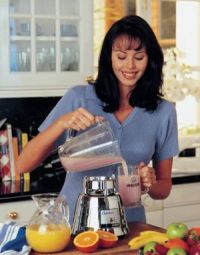 |
Fruit is a good source of fibre
and can contribute to the recommended
25-30 grams per day.
Typical deficiencies in the modern diet
are fibre, protein and nutrients. Excesses in the diet include
carbohydrates, sugars, saturated fats and salt.
Fruit is good option as a healthy snack.
However, you might be tempted to snack on fruit all day
in an attempt to lose weight. All of the food groups
are important. If you go overboard on one kind of food —
even one as terrific as fruit — you'll miss out on the valuable
properties of other healthy foods. If you want to lose weight,
eat a balanced diet, and aim to get protein into every meal
and get a balance of snacks between fruit, protein and vegetable.
Here are some top fruits that provide
valuable fibre and nutrients to the body:
|
Apples - 1 medium apple (80 calories,
0 g fat): An apple’s 3 g of fibre help you meet your fibre goal
of 25 g to 30 g daily. Foods high in fibre can lower heart disease
risk.
Apricots - 3 apricots (51 calories, 0 g fat): A
good source of beta-carotene (which is converted to vitamin A by
the body), providing the equivalent of 35% of the RDA for vitamin
A. Fibre-2.1g.
Bananas - 1 medium (105 calories, 0 g fat): Bananas
are a great source of potassium, which plays a key role in heart
health and muscle function. Plus each one has 3 g of fibre.
Blackberries - 1 cup (64 calories, 0 g fat): This
fruit boasts a whopping 8g of fibre in a single
cup.
Blueberries - 1 cup (81 calories, 0 g fat): Blueberries
help prevent and treat bladder infections by making it hard for
bacteria to stick to urinary tract walls. Fibre- 3.5.
Cherries - 1 cup (84 calories, 1 g fat): A good
source of perillyl alcohol, which helps prevent cancer in animals.
Heart-protective anthocyanins give cherries their colour; Fibre-
2.8g.
Grapefruits - 1/2 fruit (39 calories, 0 g fat):
A good source of vitamin C and a compound called naringenin, which
helps suppress tumours in animals. Fibre-2g.
Kiwi - 1 medium (46 calories, 0 g fat): Just one
little fruit packs a mean vitamin-C punch (74 mg) and 2.3 g fibre.
Mangoes - 1 mango (135 calories, 1 g fat): A single
mango has enough beta-carotene to cover your RDA for vitamin A while
racking up 57 mg of vitamin C; Fibre-3.7g.
Oranges fruits- 1 medium orange (61 calories, 0
g fat): One orange provides an impressive 50 mg to 70 mg of vitamin
C, 40 mcg of folic acid and 52 mg of calcium. Fibre-3.1g.
Papayas - 1 cup, cubed (55 calories, 0 g fat):
Loaded with vitamin C (86 mg per cup), a healthy dose of fibre (2.5
g) and a sprinkling of beta-carotene and calcium.
Purple grapes - 1 small (113 calories, 9 g fat):Offer
three heart-guarding compounds: flavonoids, anthocyanins and resveratrol
(green grapes are not rich in them).
Prunes - 1/3 cup, stewed (87 calories, 0 g fat):
Prunes’ famed laxative effect is no mystery: There are 5 g of fibre
(both soluble and insoluble) in just 1/3 cup.
Raspberries - 1 cup (60 calories, 0 g fat): Teeming
with 8g of fibre per cup, they also boast vitamin
C, ellagic acid and anthocyanins.
Strawberries - 1 cup, sliced (50 calories, 0 g
fat): Strawberries have high levels of ellagic acid and anthocyanins,
and are rich in vitamin C (95 mg per cup) and fibre (3.3 g per cup).
You may have seen that many of the protein smoothie
recipes contain fruit. And
Formula 1 will provide an additional 2.5 g fibre
per shake.
New
Healthy Meal Bars contain 8g of fibre per bar.
Additional information:
How to get
to a healthy source of protein into your diet?
Glycemic index
chart for fruit
What is dietary
fibre?
Article by Herbal Vitality
|

